|
Capital Provider Showcase
Dialogue with Jinesh Shah, Managing Partner, Omnivore
Anubhav S, Communications Manager, Omnivore
|
|

1 Omnivore has consistently supported themes such as agricultural biotechnology, climate-resilient inputs, and farmer platforms. Based on your pipeline and investment thesis, are there specific areas that you identify as high-impact yet underfunded? What do you believe is preventing capital from entering these sectors, despite their importance to India's agricultural and climate challenges?
|
In terms of Ag-biotech - biological inputs & feed, as well as sustainable materials remain significantly underfunded in India. Despite strong relevance to food security and climate resilience, investor interest is limited by perceived long commercialization timelines and the lack of exposure to FOAK (first of a kind) products.
Through the biowave event, that’s essentially a high-impact community space for investors & entrepreneurs, Omnivore is working to improve deal flow, build investor awareness, and connect deep-science entrepreneurs to the bigger investor ecosystem.
|
2
With the Biowave initiative focusing on ag-biotech innovations, have you identified any specific regulatory or market acceptance barriers unique to India that significantly delay or hinder the commercialization of promising biotech solutions? What practical strategies has Biowave adopted to navigate these hurdles?
|
The biggest barrier is not regulatory or market acceptance itself, but the lack of products that can deliver to the expectations of both. Innovation has no doubt scaled in India when it comes to agrobiologicals, but they also need to be tested in diverse agro climatic conditions, crops and other important factors. Testing these products will require access to trial stations, academic farmlands, and other facilities that can accelerate the speed at which we are introducing quality products into the market.
With the Biowave initiative, we aim to foster a sense of community and sharing in advancing India’s agriculture. Our collaborations with high-functioning institutions could help entrepreneurs get the additional infrastructure they need.
|
3
Are there any coalitions or ecosystem partnerships you’re building, or believe are essential, to accelerate scale in this space?
|
Scaling ag-biotech requires coordinated support. Biowave has partnered with Nucleate, IndieBio, BIRAC, C-CAMP, IKP, and SINE-IIT Bombay to connect entrepreneurs with lab infrastructure, regulatory navigation, business mentoring, and early-stage capital. These partnerships help address critical gaps that no single organization can solve in isolation.
|
4
In your experience, which digital technologies (like IoT, AI, or blockchain) have enabled ecosystem-level shifts in Indian agriculture? Could you share examples where technology has either unlocked new value chains or accelerated climate resilience, particularly in the context of mitigation vs. adaptation?
|
Technologies such as IoT, AI, and advanced analytics are enabling systemic improvements in Indian agriculture. For example, Ecozen’s solar-powered cold chains and irrigation systems combine IoT with renewable energy to cut losses and improve farm incomes. AgNext uses AI-driven quality assessment to bring transparency to horticulture and dairy supply chains. These solutions have accelerated both climate mitigation and the creation of new value chains.
A more novel and out-of-the-box example in terms of tech-focused innovation would be Niqo Robotics. Niqo Robotics builds robots with the ability to perform AI-powered precision-spraying. Their precision-spraying mechanism has proven to reduce chemical overuse by multifold, and that’s where technology is sort of showing usefulness in more conscious adaptation of current practices.
|
5
What differentiated approaches—whether through pricing models, behavioural nudges, or last-mile partnerships—have proven most effective in driving adoption of precision agriculture tools among India’s diverse smallholder segments?
|
For smallholders, adoption improves when tools are affordable, easy to use, and demonstrated by trusted local partners. Pay-per-use pricing, peer-led demonstrations, and bundling with input or service providers have proven effective. DeHaat is a portco that has applied these approaches to scale precision equipment and advisory services across diverse farmer segments. As a value chain platform, DeHaat, right from the beginning, aimed to be a full-stack agronomy support solution to farmers. Over time, their platform incorporated a number of services like insurance, market linkage, and, more recently, soil health advisory to provide farmers with everything they need to grow better and more profitably. As an outreach practice, DeHaat, over time, has organised many farmer demos, awareness camps, and engagement sessions to understand their needs better and to show how technology can be implemented to achieve those needs.
|
6
Considering Omnivore’s extensive portfolio in climate-smart agriculture, have you identified specific blended finance structures (first-loss guarantees or outcome-linked instruments) that uniquely enable agri-tech startups to scale faster and attract commercial investors? Could you share insights or learnings from deploying these financing approaches in India?
|
Early-stage agri-tech does benefit from blended finance that lowers investor risk. We are exploring blended finance structures with some of the world’s top pioneers in impact investing. Here, the focus is to arrive at structures that could bridge critical gaps in the startup lifecycle, particularly between Series A and Series B funding. This stage is the riskiest: companies are burning capital as they refine their models, scale operations, and test market viability.
|
8
How active is philanthropic capital (foundations, family offices) in complementing venture capital to accelerate the growth of promising climate-tech startups in agriculture? How are corporates positioned to provide the same type of complementary capital? Are there emerging models where capital from donors, DFIs, and corporates is being intentionally layered to derisk innovation and enable scale?
|
Philanthropic funding and development finance institutions often step in where traditional venture capital might hesitate, taking on the early risks that come with unproven ideas. They help build the underlying capacity and infrastructure that climate-tech startups in agriculture need before they’re ready for commercial scaling.
Corporates bring a different kind of value—market access, technical expertise, and, in some cases, strategic investments or offtake agreements that give startups a clear route to customers.
Government and policy also play a critical role here, shaping regulatory environments, providing incentives, and in some cases directly funding innovation or infrastructure. When these different forces work together—donor grants to de-risk R&D, DFI funding to strengthen operations, corporate partnerships to open markets, and enabling government policies to smooth the path to adoption—the result is a powerful springboard for scaling innovation. We’re already seeing this in action, with legacy agricultural companies working with young climate-tech ventures through targeted, outcome-driven programs, and development organisations like JICA, the Gates Foundation, and UNDP helping promising solutions move from pilot stage to real-world impact.
|
8
Innovative financial instruments like carbon credits, parametric insurance, and weather derivatives are gaining traction in climate-smart agriculture. From Omnivore’s experience, what is the real potential of these tools in de-risking smallholder livelihoods and unlocking new revenue streams? Have you come across scalable models or promising startups that are making these instruments accessible and viable at the farm level in India?
|
Carbon credits, parametric insurance and weather derivatives each offer a real lever to reduce the day-to-day risk that keeps smallholders from trying new, climate-smart practices — and to create new, recurring revenue streams — but only when they’re designed around the realities of village life.
Carbon credits can pay farmers for measurable changes (trees, soil carbon, avoided emissions). That cash matters because it’s predictable revenue you can tie to a stewardship behaviour. The friction is high: credits need reliable measurement, aggregation, and buyers who pay enough to matter. For small plots that means you cannot sell one farmer’s tiny increment on its own - you need an aggregator (co-op, buyer, or platform), remote sensing/low-cost MRV, and an upfront bridge to cover costs until credits flow.
Parametric and index insurance are powerful because they pay fast and don’t require loss assessors: if rainfall is below a threshold, the payout triggers. That quick liquidity protects livelihoods and keeps farmers from distress-selling. But the catch is basis risk — payouts don’t always match an individual farmer’s loss — and low trust if folks miss out when they expected a payment. The scalable approach is to distribute index products through trusted channels (input sellers, FPOs, digital extension platforms) and combine them with advisory and low-cost finance so the insurance is part of a package, not a stand-alone product.
Weather derivatives are essentially tools for managing enterprise-level exposure to weather (useful for aggregators, larger cooperatives, and off-takers), less so for an individual marginal farmer. They unlock capital for processors, traders or aggregators who then can pass reduced risk down the chain — but they require more sophisticated counterparties and markets.
Where these instruments become viable at scale is when they’re bundled and layered with other forms of capital and capacity. Ecosystem offerings to de-risk livelihoods are a constructive way forward as we see it.
|
|
|

Jinesh Shah, Managing Partner, Omnivore
Jinesh Shah is the Managing Partner of Omnivore, an impact venture capital firm that supports visionary founders advancing agrifood innovation, climate action, and rural transformation. Over the past decade, Omnivore pioneered agritech and climate-smart venture investing in India and currently manages USD 295 million across two active venture funds.
Previously, he was Vice President and CFO at Nexus Venture Partners, one of India’s leading venture capital funds. Earlier in his career, Jinesh worked in corporate finance roles for Datamatics (leading Treasury/M&A), Patni Computers (initiating the IPO process), and HCL Technologies (founding the BPO business). He is a member of the IMC Chamber of Commerce and Industry’s Agriculture & Food Processing Committee, the JITO Incubation & Innovation Foundation (JIIF), the core working group of the World Economic Forum related to agriculture, the CII National Council on Agriculture, and the chair of CII’s agtech task force. Recently, he joined the NITI Frontier Tech Hub Expert Council for the Future of Agriculture. Jinesh is a Chartered Accountant with a B.Com from R A Poddar College and an MMS (Finance) from JBIMS.
Anubhav S, Communications Manager, Omnivore
Anubhav joined Omnivore in 2025 as a Communications Manager and is based out of their Bangalore office. He focuses on amplifying the firm's voice in the climate tech space, particularly through scientific storytelling and climate-action narratives.
Previously, Anubhav spent 4 years as Content Manager at Absolute, one of India's premier biotech startups - where he managed corporate communications with diverse stakeholders - including policy makers, bio-scientific fraternities, climate activists, farmers, and investors.
Anubhav holds a Bachelor’s degree in Journalism & Mass Communications from Manipal University Jaipur and a certificate in "Transformation of the Global Food System" from University of Copenhagen.
About Omnivore
Omnivore is a venture capital firm investing in startups that are building the future of agriculture, food, and climate resilience in India. Founded in 2011, Omnivore supports entrepreneurs working at the intersection of deep science, sustainability, and rural transformation.
|
|
About Impact Investors Council:
Impact Investors Council, India (IIC) is a member-based national industry body formed with an
objective to build and strengthen the impact investing eco-system in India. To know more about our work visit https://iiic.in or reach out to secretariat@iiic.in
|
Disclaimer: Data and Information in this newsletter is made available in good faith with the exclusive intention of helping market and ecosystem players, policymakers and the public build a greater
understanding of the Indian impact investing market. The data is collated from sources believed to be reliable and accurate at the time of publication. Readers are urged to exercise independent judgment and diligence in the
usage of this information for any investment decisions
Some of the information provided in this newsletter is supplied by third parties. It is important that all users understand that third party information is not an endorsement of any nature and has been put together with the
sole purpose of benefiting stakeholders.
|
| Unsubscribe |
|
|
|



